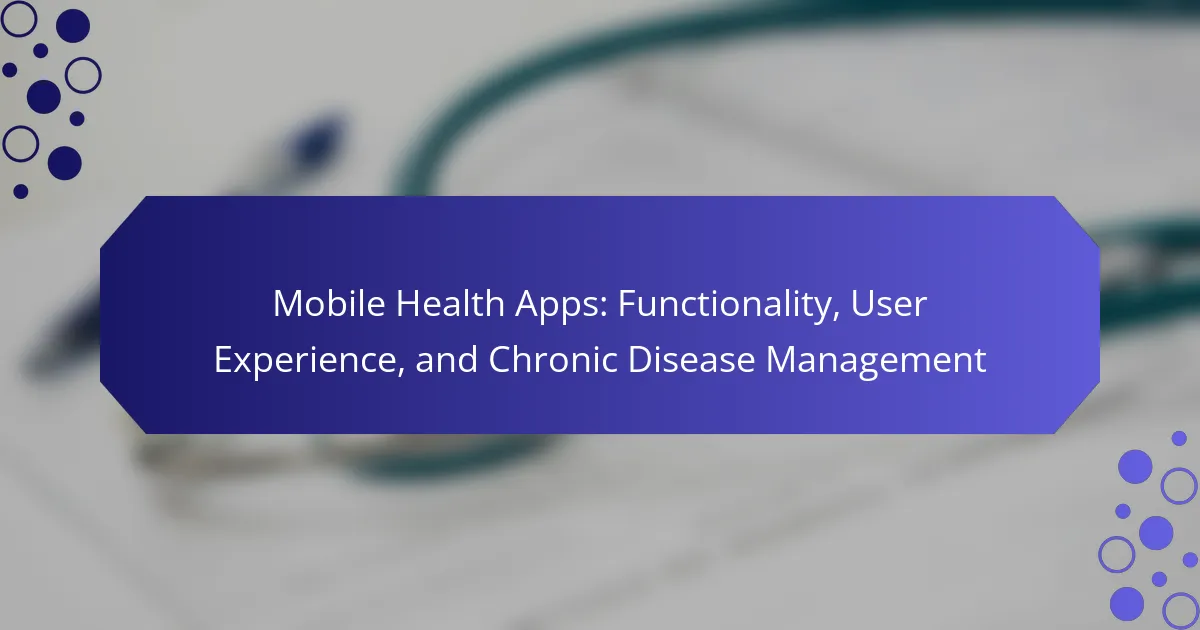Mobile health apps enhance chronic disease management by offering features like symptom tracking, medication reminders, and telehealth services. User experience plays a crucial role in engagement and adherence. Key metrics such as user satisfaction and clinical outcomes help evaluate app effectiveness. Understanding unique attributes and limitations can guide users in selecting the right mobile health app for their needs.
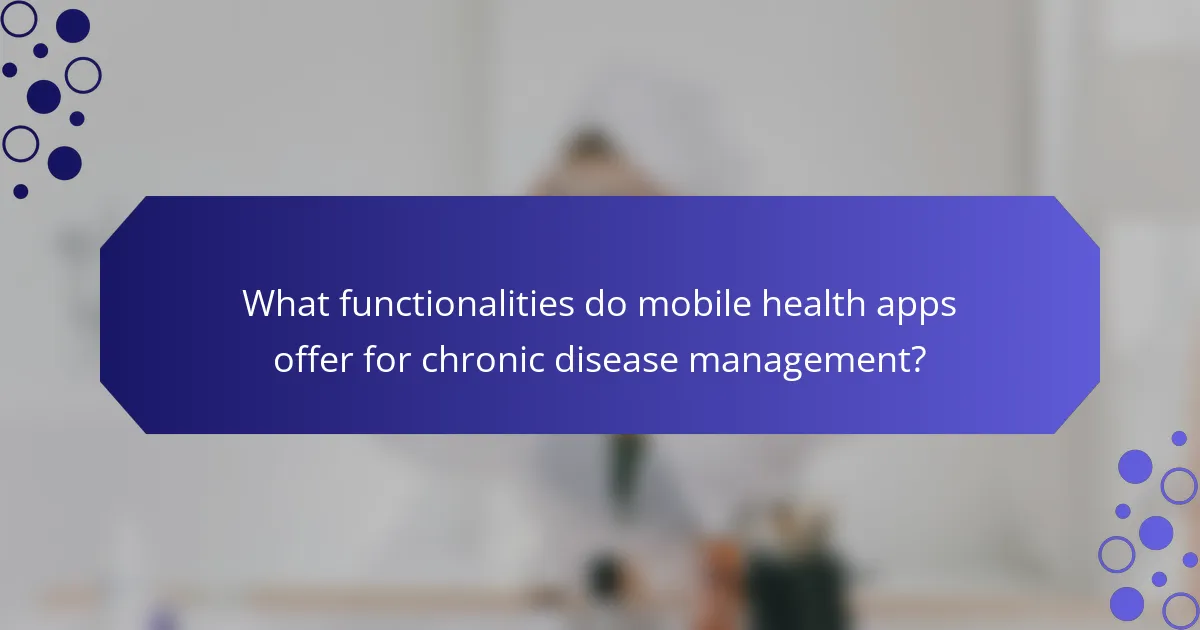
What functionalities do mobile health apps offer for chronic disease management?
Mobile health apps offer functionalities such as symptom tracking, medication reminders, and telehealth services for chronic disease management. These features enhance patient engagement and improve health outcomes.
1. Symptom tracking: Users can log daily symptoms, helping healthcare providers tailor treatments.
2. Medication reminders: Automated alerts ensure adherence to prescribed regimens, reducing complications.
3. Telehealth services: Virtual consultations provide access to healthcare professionals, facilitating timely interventions.
4. Data sharing: Users can share health data with providers, improving diagnosis and management.
5. Educational resources: Access to information about chronic conditions empowers users to make informed decisions.
How do tracking features enhance patient engagement and adherence?
Tracking features significantly enhance patient engagement and adherence by providing real-time feedback and personalized insights. These features foster accountability and motivation, encouraging patients to stay on track with their health goals.
Mobile health apps utilize tracking to monitor medication schedules, symptom progression, and lifestyle changes. For instance, reminders and progress reports can lead to a 30% increase in adherence rates. Additionally, data analytics can identify patterns that inform tailored interventions, enhancing the overall user experience.
The unique attribute of these apps is their ability to integrate with wearable devices, providing continuous health monitoring. This integration allows for immediate adjustments to treatment plans, ensuring patients receive timely support. As a result, tracking features not only improve adherence but also empower patients to take an active role in their health management.
What role do telehealth services play in mobile health apps?
Telehealth services significantly enhance mobile health apps by providing remote access to healthcare professionals. These services enable real-time consultations, improving patient engagement and chronic disease management. They also facilitate personalized care plans, leveraging data collected through the apps to tailor interventions. As a result, users experience a more integrated healthcare approach, leading to better health outcomes and increased satisfaction.
Which data analytics tools are integrated into mobile health apps?
Mobile health apps integrate various data analytics tools to enhance functionality and user experience. Common tools include Google Analytics for user behavior tracking, Tableau for data visualization, and IBM Watson for predictive analytics. These tools help in chronic disease management by providing insights into patient data and improving decision-making processes. Additionally, some apps utilize machine learning algorithms to personalize user experiences and optimize health outcomes.
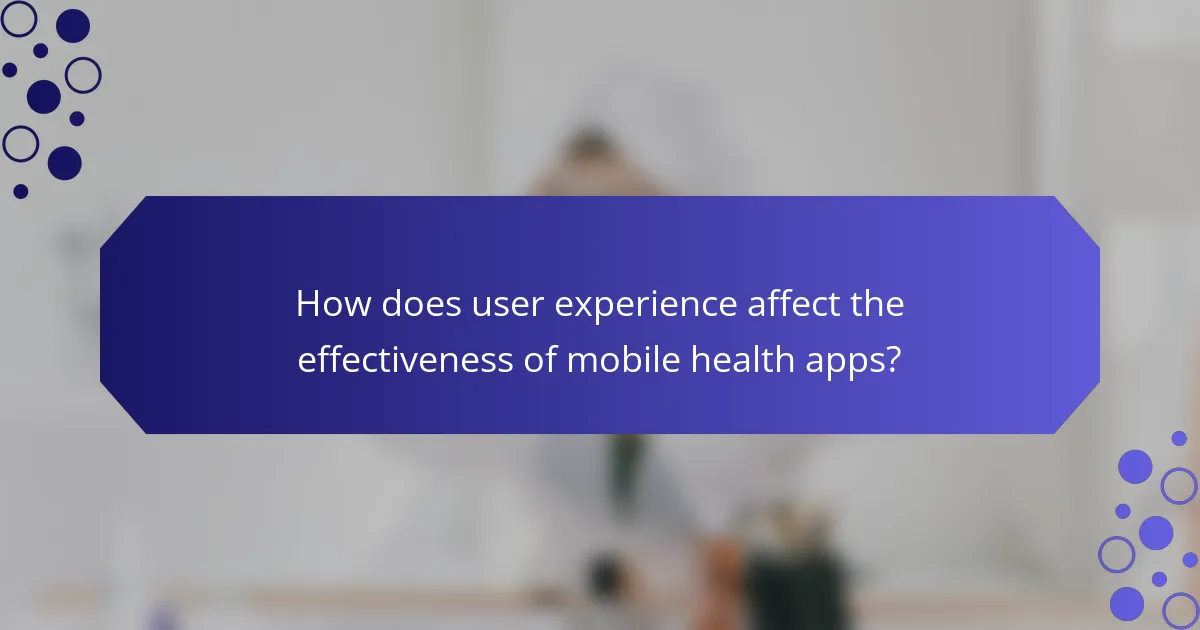
How does user experience affect the effectiveness of mobile health apps?
User experience significantly impacts the effectiveness of mobile health apps by influencing user engagement and adherence to health management. A positive user experience enhances usability, making it easier for users to navigate features and access health data. Studies indicate that apps with intuitive designs and personalized content increase user satisfaction and retention rates. Furthermore, effective user experience can lead to improved health outcomes, as users are more likely to utilize app features consistently when they find them enjoyable and easy to use.
What design principles contribute to a positive user experience?
Effective design principles for mobile health apps enhance user experience by prioritizing usability, accessibility, and engagement. Key principles include intuitive navigation, clear visual hierarchy, responsive design, and personalized content. These attributes ensure users can easily manage chronic diseases through seamless interactions and relevant information. For example, intuitive navigation reduces cognitive load, allowing users to focus on health management rather than app complexity.
How do personalization features impact user satisfaction?
Personalization features significantly enhance user satisfaction in mobile health apps. These features tailor user experiences, improving engagement and adherence to health management plans. Personalized notifications and recommendations can lead to better health outcomes, as users feel more connected and motivated. Additionally, customization options allow users to set personal health goals, fostering a sense of ownership over their health journey. Overall, personalization transforms user interactions, making them more relevant and effective.
What are the common user interface challenges faced by mobile health apps?
Mobile health apps often face user interface challenges that impact functionality and user experience. Key issues include inconsistent navigation, which can confuse users; inadequate feedback mechanisms that fail to inform users about their actions; and poor accessibility features that hinder usability for individuals with disabilities. Additionally, limited customization options can make it difficult for users to tailor the app to their needs, while complex data presentation can overwhelm users, leading to disengagement. Addressing these challenges is essential for improving user satisfaction and enhancing chronic disease management.
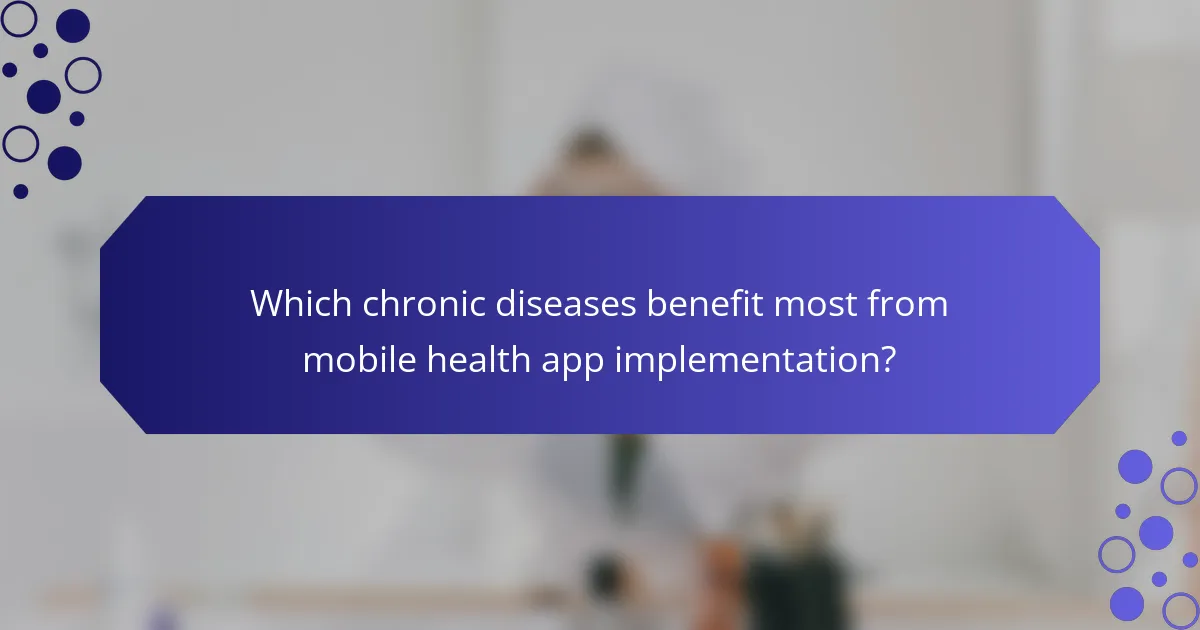
Which chronic diseases benefit most from mobile health app implementation?
Chronic diseases that benefit most from mobile health app implementation include diabetes, hypertension, obesity, asthma, and mental health disorders. These conditions see improved management through real-time monitoring, patient engagement, and personalized care plans. For instance, diabetes management apps allow users to track blood sugar levels and receive dietary recommendations, enhancing patient outcomes. Similarly, hypertension apps facilitate medication adherence and lifestyle modifications, contributing to better blood pressure control. As a result, mobile health apps play a crucial role in chronic disease management by promoting self-care and improving healthcare access.
How do mobile health apps support diabetes management?
Mobile health apps significantly enhance diabetes management by providing tools for monitoring, education, and communication. These apps allow users to track blood sugar levels, medication schedules, and dietary habits, fostering better self-management.
Real-time data sharing with healthcare providers ensures timely interventions and personalized care plans. For instance, some apps offer reminders for medication and glucose testing, which can improve adherence rates.
Additionally, educational resources within these apps empower users with knowledge about diabetes, promoting healthier lifestyle choices. Features like community forums provide support and motivation, helping users connect with others facing similar challenges.
Overall, mobile health apps serve as comprehensive platforms that integrate various aspects of diabetes management, improving health outcomes and quality of life.
What features are essential for cardiovascular disease management apps?
Essential features for cardiovascular disease management apps include user-friendly interfaces, real-time health monitoring, medication reminders, and educational resources. These functionalities enhance user engagement and adherence to treatment plans. Integration with wearable devices can provide valuable health data, while personalized feedback helps users make informed lifestyle choices. Data security is crucial to protect sensitive health information.
How can mobile health apps assist in mental health care?
Mobile health apps can significantly enhance mental health care by providing accessible resources and support. They offer features like symptom tracking, mood monitoring, and guided therapy exercises. These apps often include community support forums, enabling users to connect with others facing similar challenges. Additionally, many apps provide personalized insights based on user data, promoting tailored interventions. The integration of mental health apps into care plans can improve adherence to treatment and increase overall well-being.
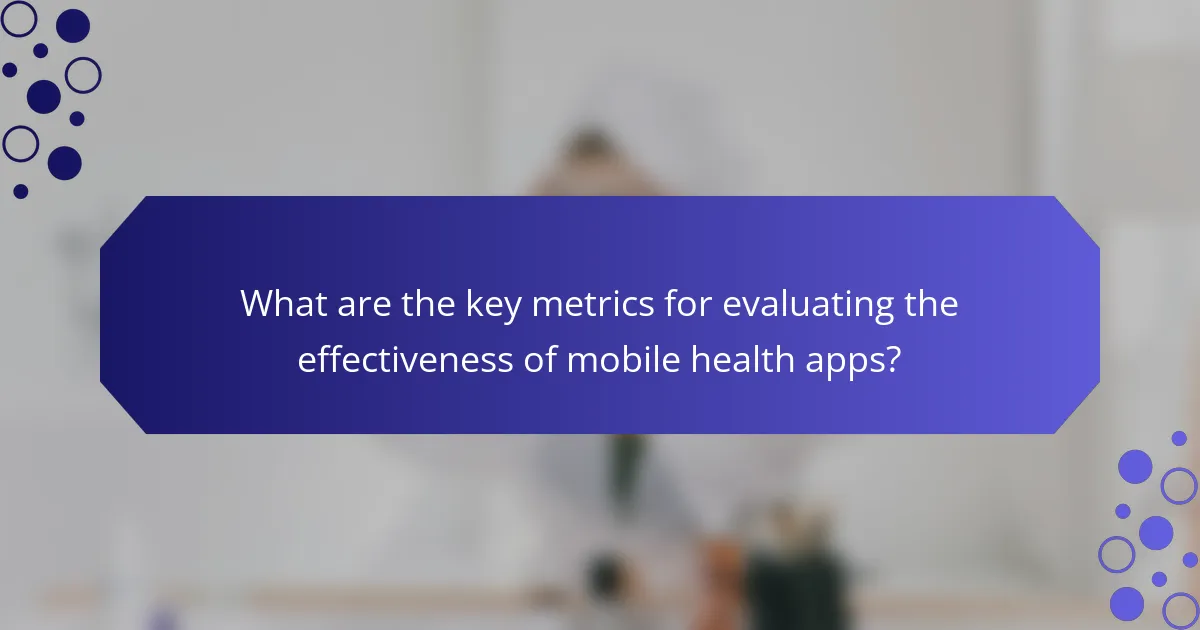
What are the key metrics for evaluating the effectiveness of mobile health apps?
Key metrics for evaluating mobile health app effectiveness include user engagement, clinical outcomes, and user satisfaction. These metrics help assess how well the app supports chronic disease management and enhances user experience.
User engagement can be measured by active users, session length, and frequency of use. Clinical outcomes refer to improvements in health metrics, such as reduced symptoms or improved adherence to treatment plans. User satisfaction is often gauged through surveys and app ratings, reflecting the overall experience and usability.
By analyzing these metrics, developers can identify areas for improvement and ensure the app meets user needs effectively.
Which user engagement metrics are most indicative of app success?
User engagement metrics that indicate app success include daily active users, session length, retention rate, and user feedback scores. These metrics reflect how effectively mobile health apps engage users in managing chronic diseases.
Daily active users measure the number of unique users interacting with the app daily, demonstrating its relevance. Session length indicates how long users stay engaged, which can correlate with user satisfaction. Retention rate shows the percentage of users returning over time, highlighting the app’s value. User feedback scores provide qualitative insights into user experience and areas for improvement.
Tracking these metrics helps developers enhance functionality and user experience, ultimately supporting chronic disease management more effectively.
How can health outcomes be measured through app usage data?
Health outcomes can be measured through app usage data by analyzing user engagement metrics, symptom tracking, and health behavior changes. Mobile health apps collect data on user interactions, which helps identify trends in chronic disease management. For instance, increased app usage often correlates with improved medication adherence and lifestyle changes. Additionally, user feedback can provide qualitative insights into health outcomes, enhancing the app’s effectiveness in managing chronic conditions.
What are the challenges in data privacy and security for mobile health apps?
Mobile health apps face significant challenges in data privacy and security, primarily due to sensitive health information handling. Key issues include data breaches, lack of encryption, and inadequate user consent mechanisms.
Data breaches can expose personal health information, leading to identity theft and loss of trust. Many apps do not implement strong encryption methods, making data vulnerable during transmission. Additionally, unclear consent processes can result in users unknowingly sharing their data with third parties.
Regulatory compliance adds complexity, as developers must navigate various laws like HIPAA in the U.S. or GDPR in Europe. User education is also critical; many users are unaware of their rights regarding data privacy.
Addressing these challenges requires robust security measures, transparent practices, and ongoing user engagement to build trust and ensure compliance.
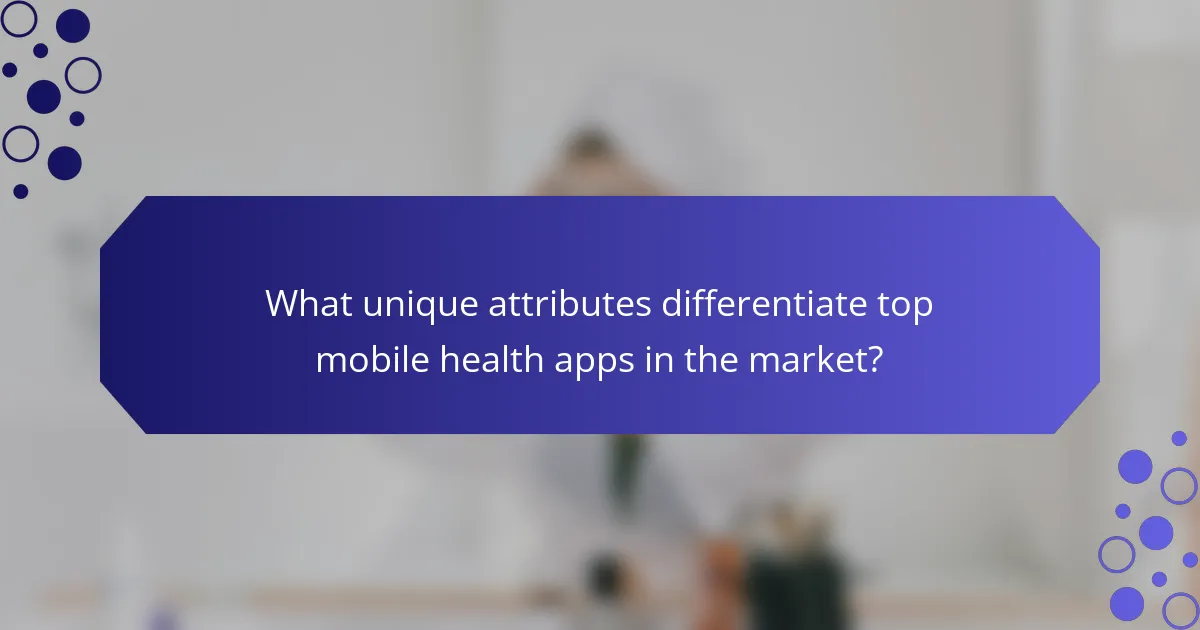
What unique attributes differentiate top mobile health apps in the market?
Top mobile health apps differentiate themselves through unique attributes like personalized user experiences, integration with wearable devices, and advanced data analytics. These features enhance functionality and improve chronic disease management. For example, apps that offer tailored health plans based on user data demonstrate a unique attribute that sets them apart. Additionally, intuitive user interfaces and gamification elements contribute to user engagement, providing a rare combination of motivation and usability. Integration capabilities with telehealth services further distinguish leading apps in a competitive market.
How do partnerships with healthcare providers enhance app credibility?
Partnerships with healthcare providers significantly enhance app credibility by ensuring evidence-based practices and expert validation. Collaborations with trusted medical institutions or professionals foster user trust and promote adherence to clinical guidelines. These partnerships can also improve user engagement and retention, as users feel more secure using apps backed by recognized authorities. Additionally, healthcare partnerships can facilitate access to valuable data, enabling continuous app improvement and personalized user experiences.
What innovative features are emerging in 2025 mobile health apps?
Innovative features emerging in 2025 mobile health apps include AI-driven personalized health recommendations, integration with wearable devices for real-time monitoring, enhanced data privacy measures, and advanced telehealth capabilities. These features aim to improve user engagement and chronic disease management. For instance, AI algorithms analyze user data to provide tailored health insights, while wearables track vital signs, enabling proactive health interventions. Enhanced privacy protocols ensure user data security, addressing growing concerns about data breaches. Advanced telehealth functionalities facilitate seamless virtual consultations, improving access to healthcare services.
Which user demographics show the highest adoption rates for specific apps?
Young adults and individuals managing chronic conditions show the highest adoption rates for mobile health apps. Research indicates that users aged 18-34 frequently engage with these apps for fitness tracking and health monitoring. Additionally, patients with chronic diseases utilize mobile health apps to manage their conditions effectively, enhancing adherence to treatment plans. This demographic trend highlights the importance of user experience and functionality in app design.
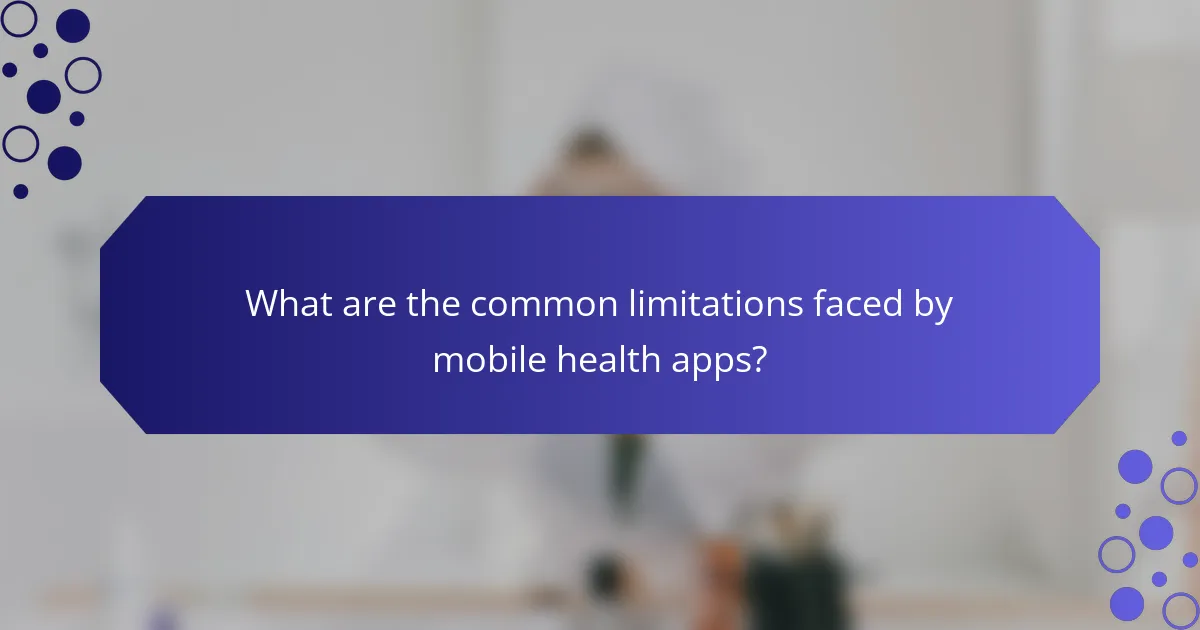
What are the common limitations faced by mobile health apps?
Mobile health apps commonly face limitations such as lack of interoperability, insufficient user engagement, privacy concerns, and limited functionality. These issues hinder their effectiveness in chronic disease management and user experience.
Interoperability challenges arise when apps cannot seamlessly share data with healthcare systems, leading to fragmented care. User engagement is often low due to complex interfaces or lack of personalized features, which can reduce adherence to health regimens. Privacy concerns are prevalent, as users worry about data security and misuse of personal health information. Additionally, many apps have limited functionality, offering basic tracking without advanced analytics or integration with medical devices.
How do technical issues impact user retention?
Technical issues significantly decrease user retention in mobile health apps. Users expect seamless functionality and a smooth user experience. Frequent crashes, slow load times, and navigation difficulties lead to frustration, prompting users to abandon the app. A study found that 70% of users uninstall apps due to poor performance.
Moreover, technical glitches can disrupt chronic disease management, impacting users’ ability to track symptoms or medications. This can erode trust in the app’s reliability. As a result, addressing technical issues is crucial for maintaining user engagement and ensuring effective disease management.
What are the barriers to accessibility for diverse populations?
Barriers to accessibility for diverse populations using mobile health apps include language differences, limited digital literacy, and socioeconomic factors. These challenges hinder effective chronic disease management and user experience.
Language barriers can prevent understanding of app features, while low digital literacy limits navigation and usage. Socioeconomic factors, such as lack of internet access or smartphones, further restrict app engagement. Addressing these barriers is essential for improving health outcomes in diverse communities.
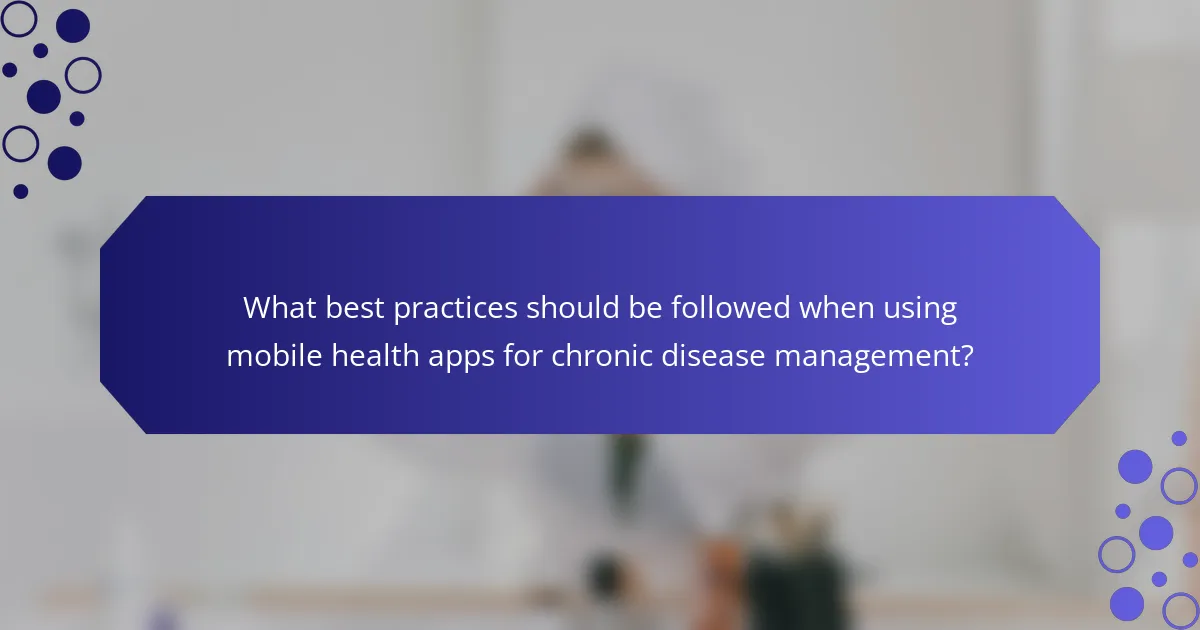
What best practices should be followed when using mobile health apps for chronic disease management?
To effectively use mobile health apps for chronic disease management, prioritize user-friendly design and data security. Ensure the app provides personalized features, regular reminders, and easy access to health records.
1. Choose apps that integrate with wearable devices for real-time data tracking.
2. Opt for apps with customizable settings to cater to individual health needs.
3. Verify the app’s compliance with health regulations to ensure data privacy.
4. Look for apps that offer educational resources to enhance disease understanding.
How can users optimize their experience with mobile health apps?
Users can optimize their experience with mobile health apps by focusing on personalization, usability, and integration. Personalization allows users to tailor features to their specific health needs, enhancing engagement. Usability ensures that the app is intuitive and easy to navigate, minimizing frustration. Integration with other health devices or platforms provides a comprehensive view of health data, facilitating better management of chronic diseases. Regularly updating the app and utilizing feedback can further improve user satisfaction and functionality.
What strategies can healthcare providers use to encourage app adoption among patients?
Healthcare providers can encourage app adoption by simplifying user onboarding, offering personalized content, and integrating app functionalities with existing healthcare services. Engaging patients through educational initiatives and showcasing app benefits can also enhance adoption rates. Providing ongoing support and feedback mechanisms further fosters user commitment.
What common mistakes should users avoid when using mobile health apps?
Users should avoid several common mistakes when using mobile health apps. These include neglecting to set realistic goals, overlooking data privacy settings, failing to regularly update the app, and not engaging with community features.
Neglecting to set realistic goals can lead to frustration and decreased motivation. Overlooking data privacy settings may expose personal health information. Failing to regularly update the app can result in missing out on new features and security improvements. Not engaging with community features can limit support and motivation from peers.
By being mindful of these mistakes, users can enhance their experience and effectively manage chronic diseases through mobile health apps.
